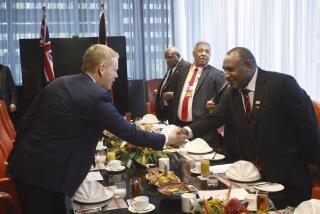U.S.-China Pact Dispute Settled : Nuclear Accord May Be Signed Later This Month
- Share via
WASHINGTON — The United States and China have resolved a disagreement over Chinese aid to Pakistan’s nuclear program, apparently clearing the way for the signing of a long-delayed agreement to allow U.S. nuclear exports to Peking, officials said Wednesday.
Some officials said that the pact, which could result in as much as $20 billion in sales for U.S. firms, may be ready for signing when Chinese President Li Xiannian visits Washington later this month.
U.S. and Chinese officials initialed the agreement in April, 1984, during a visit by President Reagan to Peking, but its formal signing and approval by Congress were delayed after Democrats charged that China was helping Pakistan develop nuclear weapons.
The Administration then asked the Chinese for specific guarantees that American nuclear technology would not be exported in violation of U.S. guidelines. The Chinese refused to make any additional written commitments, arguing that Premier Zhao Ziyang had already given his word that Peking would not help other countries develop nuclear weapons.
China has refused to sign the 1968 nuclear non-proliferation treaty because it considers it biased in favor of the United States and the Soviet Union.
Last month, Richard T. Kennedy, special adviser to Secretary of State George P. Shultz on nuclear issues, made an unannounced trip to Peking and received new assurances that the Chinese commitment on non-proliferation would satisfy U.S. concerns, officials said.
“Substantial progress was made in clarifying the views of the two sides on non-proliferation affairs and the respective policies of the two sides,” State Department spokesman Robert Smalley said of Kennedy’s talks.
U.S. Consent on Fuel
Specifically, one source said, the Chinese have reassured the United States that they will not re-use American-supplied nuclear fuel without U.S. consent and that they have withdrawn two Chinese physicists from a Pakistani uranium enrichment plant.
Those assurances are contained in secret memoranda agreed to during Kennedy’s visit, leaving the main text of the agreement unchanged.
Smalley said the remaining formal steps before the agreement is signed are the approval of the Department of Energy and the Nuclear Regulatory Commission, and a certification by the Arms Control and Disarmament Agency that the pact would not conflict with the non-proliferation treaty.
He said he did not know whether those steps, and the President’s final approval, could be completed before the Chinese leader’s scheduled departure from Washington on July 25, but that “we’re certainly somewhere well along the line on all this.”
Cranston Undecided
Congress would have 60 days after the agreement is signed to consider legislation to block its ratification. Kennedy briefed Sen. Alan Cranston (D-Calif.), a leading critic of the agreement, on Tuesday, but Cranston has not yet decided whether he believes the new assurances are sufficient, an aide said.
Cranston has asked the Administration to submit the new U.S.-Chinese understandings to Congress, along with the main text of the agreement, and Kennedy agreed, the aide said. However, the understandings are expected to remain secret at China’s request.
The agreement would provide a legal framework for U.S. firms to build and supply nuclear reactors for the Peking government, which plans to build as many as eight nuclear power plants in the next two decades.
Nuclear industry executives, facing declining demand for new power plants in the United States, have said that China may be the world’s largest untapped market for their products.
More to Read
Sign up for Essential California
The most important California stories and recommendations in your inbox every morning.
You may occasionally receive promotional content from the Los Angeles Times.














